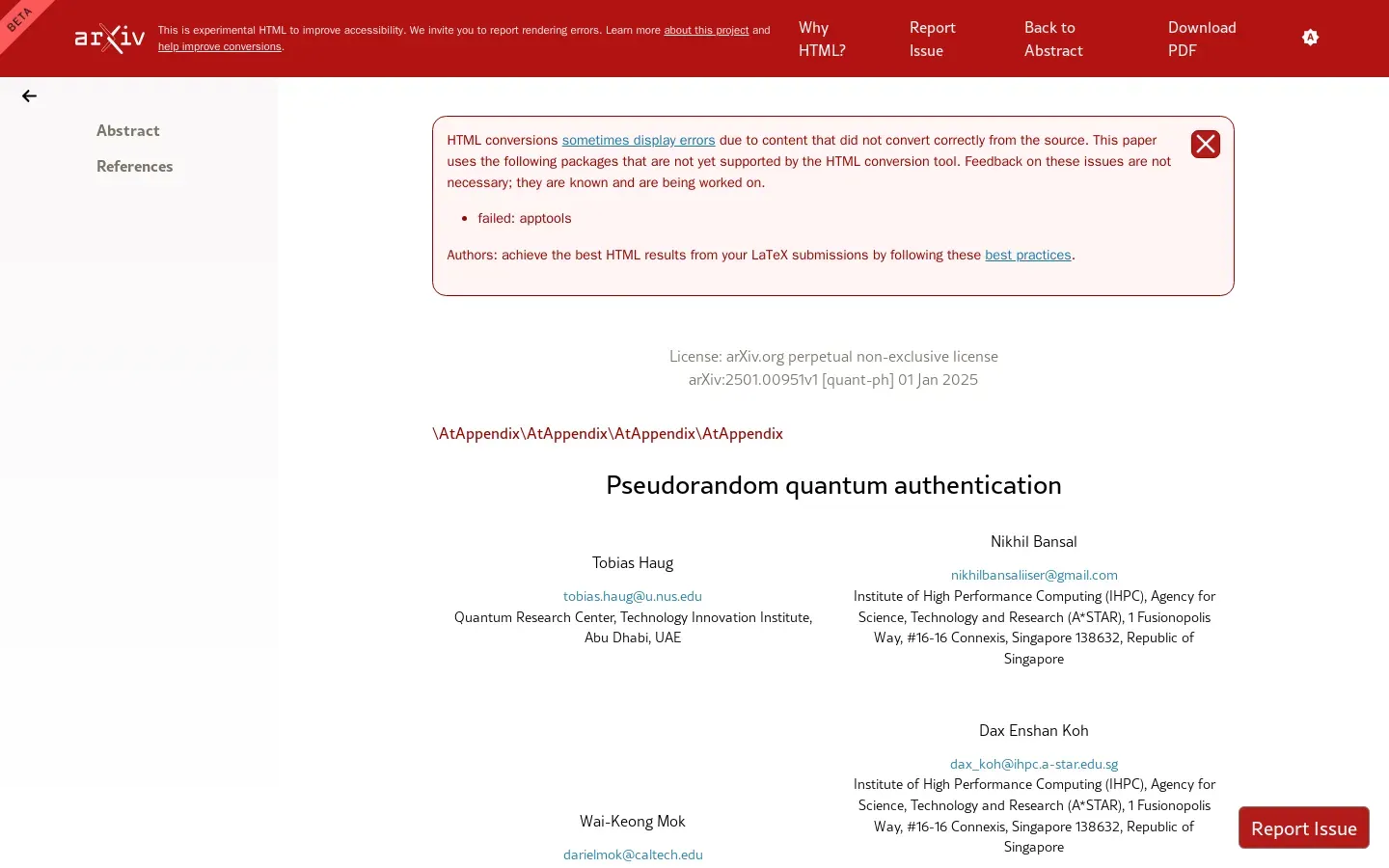
Advancements in Pseudorandom Quantum Authentication Techniques
/ 4 min read
Quick take - Researchers have made significant advancements in quantum encryption methods, particularly through the development of a Pseudorandom Quantum Authentication Scheme, which enhances security against eavesdropping and addresses current vulnerabilities in cybersecurity as quantum technologies evolve.
Fast Facts
- Researchers have made significant advancements in quantum encryption, focusing on a Pseudorandom Quantum Authentication Scheme (PQAS) to enhance security against eavesdropping.
- The study utilized techniques like Pseudorandom Unitaries (PRUs) and One-Way State Generators (OWSGs) to create secure quantum states and improve quantum key distribution (QKD) protocols.
- Key findings include the effectiveness of mixed unitary noise channels and Verifiable Pseudorandom Density Matrices (VPRDMs) in maintaining the integrity of quantum states in noisy environments.
- The research suggests that integrating these advanced encryption methods could transform cybersecurity practices, particularly in cloud computing and post-quantum cryptography.
- Future directions include real-world implementation of quantum security protocols and exploration of quantum error correction to ensure system reliability.
As the digital landscape continues to evolve, the need for robust cybersecurity measures has never been more pressing. Traditional encryption methods face increasing threats from sophisticated adversaries and emerging technologies like quantum computing. This has sparked a wave of research aimed at developing quantum encryption methods that not only enhance security but also take advantage of the peculiar properties of quantum mechanics. The ongoing exploration into quantum cryptography and authentication holds promise for transforming the way we secure sensitive information against eavesdropping and unauthorized access.
At the heart of this research are several promising techniques, including Pseudorandom Unitaries (PRUs) and Verifiable Pseudorandom Density Matrices (VPRDMs), which offer new avenues for creating secure communication protocols. By utilizing pseudorandom density matrices (PRDMs), researchers are uncovering ways to improve the fidelity and randomness integral to quantum encryption, ensuring that quantum resources remain hidden from potential eavesdroppers. The implications of these developments could be groundbreaking, especially as they relate to Quantum Key Distribution (QKD), which can benefit significantly from enhanced protocols designed to withstand chosen-plaintext attacks.
Among the breakthroughs is the Pseudorandom Quantum Authentication Scheme (PQAS), which focuses on establishing secure mechanisms for authenticating quantum states while addressing vulnerabilities inherent in traditional cryptographic protocols. The PQAS aims at creating a framework where key recycling is employed without compromising security—a crucial aspect in an era where resource management is paramount. This integration not only enhances security protocols but also aligns with the need for cost-effective solutions that can operate efficiently in real-world settings, particularly in cloud computing environments.
Another critical element of this research is the emphasis on noise robustness, recognizing that environmental factors can significantly impact quantum systems’ performance. By analyzing mixed unitary noise channels, researchers have made strides in ensuring that quantum states can maintain their integrity amidst unavoidable disturbances. This focus on stability and reliability is essential for practical implementations of quantum security protocols, especially when considering future applications in post-quantum cryptography.
Despite these advancements, challenges remain. The importance of approximate designs in quantum protocols cannot be understated; they play a vital role in ensuring that security conditions are met when dealing with complex systems. There’s a pressing need for further exploration into non-deterministic encryption methods, which may provide additional layers of security against evolving cyber threats.
In summary, the ongoing research into quantum encryption and authentication schemes highlights an exciting frontier in cybersecurity. The tools and methodologies developed—ranging from one-way state generators to entangled fidelity indicators—collectively contribute to creating secure and efficient systems capable of safeguarding against an array of digital attacks. As we look toward the future, it’s clear that integrating quantum principles into our cybersecurity frameworks will not only bolster defenses but also redefine what we consider secure communication in an increasingly interconnected world. The journey is just beginning, and with it comes the potential for revolutionary changes in how we protect our most sensitive data from prying eyes in an era defined by rapid technological advancement.



